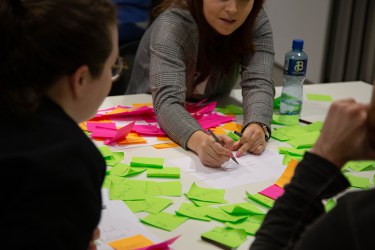Co-creation can be defined in quite a number of ways depending on the context in which it is adopted. The slight differences in the definition entail significant variations in the objectives, the actors involved, the processes and the tools used.
SISCODE interprets co-creation as an integral process that ranges from the identification of needs and opportunities to their transformation into a working object (be it a product, a service, a programme, etc.), its assessment and adjustment.
Co-creation thus includes co-design and co-production along a continuum, linking them respectively to phases of problem identification, reframing and design (ideation/formulation), and phases of concrete realisation (implementation/actuation). The idea of non-linearity renders a structural gap between ideal models/cycles and reality, where feedback, restart and recirculation are the norms more than the exception.

